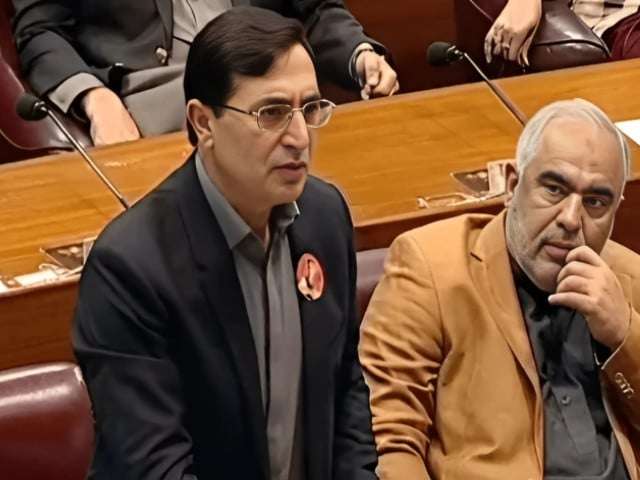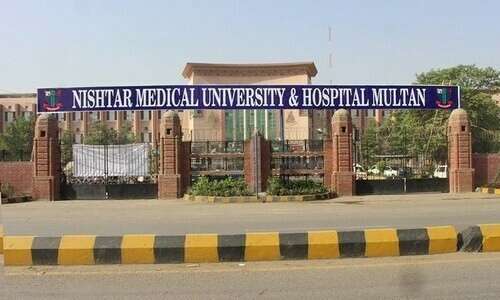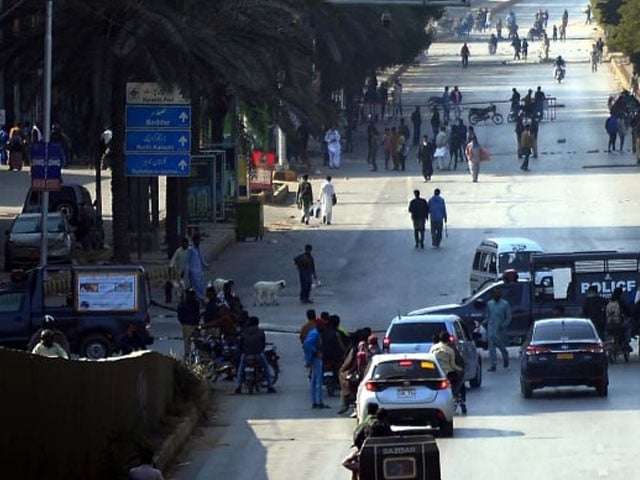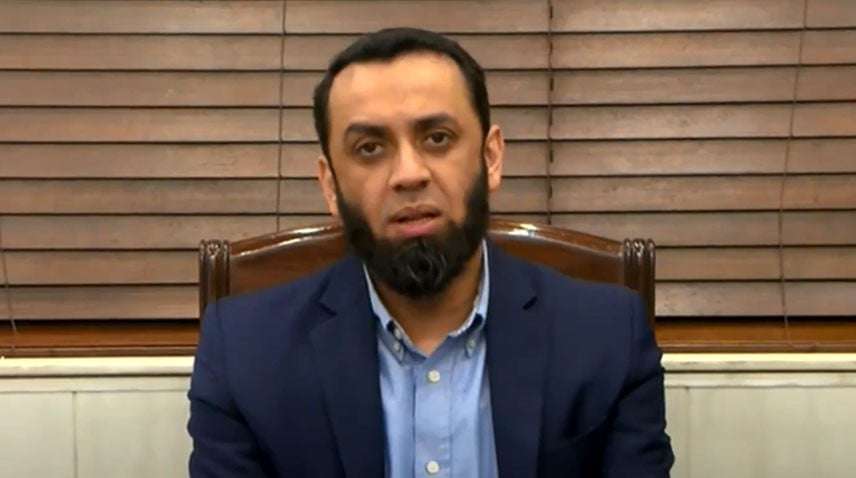In a statement made exclusively to Express News, Barrister Gohar, Chairman of Pakistan Tehreek-e-Insaf (PTI), emphasized that the court martial of General (retd) Faiz Hameed must be handled solely within the military’s jurisdiction and should not be politicized. According to Gohar, the matter is a strictly military issue, and it is for the armed forces to decide on any punishment related to Faiz Hameed’s case, under the Army Act.
PTI’s Stance on Faiz Hameed’s Court Martial
Barrister Gohar firmly stated that PTI has no involvement in the ongoing proceedings of General Faiz Hameed’s court martial. He reiterated that the issue of Hameed’s arrest and trial must remain within the internal accountability processes of the army, away from political debates. Asserting that the case is a professional military matter, Gohar called on all parties to refrain from turning it into a political issue, as this would undermine the integrity of the military’s decision-making process.
“General Faiz Hameed has been subjected to the Army Act, and it is for the military to decide what action to take. PTI has no influence on this matter,” Gohar remarked. He emphasized that the military’s internal processes should be allowed to function without external interference, whether from political parties or other actors.
PTI’s Commitment to Political Dialogue and Negotiations
Barrister Gohar also took the opportunity to highlight PTI’s broader political approach. During his interview, Gohar called for the government to facilitate meaningful political negotiations and dialogue within the parliament. According to him, the political turmoil following the events of May 9 needs to be resolved through talks, rather than through escalating tensions.
PTI’s leadership believes that a permanent political solution can be achieved through dialogue. Gohar urged the parliament to establish a formal path for these discussions to move forward, so that the instability caused by the May 9 incident can be laid to rest. He said, “We are committed to resolving our issues through dialogue, not through confrontation. The committee for negotiations has been formed, and it should not be seen as a sign of weakness. We seek to resolve our issues peacefully.”
The Call for Negotiations: PTI’s Political Vision
Barrister Gohar emphasized that, if the government fails to provide a pathway for negotiations, PTI will have no other option but to return to street protests. He cautioned the government not to push the party into such a situation. “If there is no way forward through negotiations, we will be forced to take to the streets again. We don’t want to go down that path. Let’s settle our differences in parliament,” he warned.
He highlighted how PTI’s leadership is striving to engage in a productive dialogue to resolve the political crisis in the country. However, he emphasized that the government must step up and take responsibility for creating a conducive environment for negotiations.
The Government’s Handling of the May 9 Protests
The May 9 protests have been a subject of intense controversy and debate. During the National Assembly session, Barrister Gohar addressed the government’s heavy-handed response to the protests, particularly the use of force against unarmed demonstrators. He pointed out that during similar protests in other countries, such as Brazil, demonstrators managed to enter legislative buildings without facing gunfire, unlike in Pakistan, where the government responded with bullets.
“The government’s narrative about the protests, particularly the claims about gunfire being instigated by PTI’s own officials, is completely absurd,” Gohar said. He criticized the government’s refusal to acknowledge that bullets were fired, and he questioned why the deaths of innocent protestors were being ignored. According to him, the government had previously filed charges for similar incidents but had later apologized and moved on. He asked, “Could the government not have shown compassion and offered solace to the martyrs of May 9?”
The Use of the “Pashtun Card” and Political Narratives
One of the points Gohar addressed was the allegation that PTI was using the “Pashtun card” for political gain. He vehemently rejected this accusation, asserting that PTI’s protestors were peaceful and unarmed. He emphasized that PTI has always been committed to peaceful demonstrations and that the party’s core strength lies in its ability to rally the masses without resorting to violence. “We are not playing the Pashtun card. We are simply advocating for the rights of the people,” Gohar said.
He also addressed the political narrative that often undermines PTI’s credibility. Gohar noted that PTI’s popularity had already been demonstrated through events like the February 8 rally, and the party did not need rallies to boost its popularity. “Imran Khan’s popularity speaks for itself,” he remarked.
Criticism of the Government’s Actions
Throughout his interview, Barrister Gohar was scathing in his criticism of the government’s response to PTI’s peaceful protests. He pointed to previous incidents, such as the deaths during the implementation of Sharia law, where the government had filed charges but later apologized, suggesting that the government had failed to offer solace or support to the families of those who had lost their lives. He questioned the selective approach to justice, where similar incidents had been forgiven without proper acknowledgment of the victims.
Ongoing Tensions in the National Assembly
The National Assembly session saw heated exchanges between the ruling Pakistan Muslim League-Nawaz (PML-N) and PTI members, as both sides continued to clash over the alleged casualties from the November 26 standoff. Opposition Leader Omar Ayub accused Prime Minister Shehbaz Sharif of ordering security personnel to open fire on PTI protesters. The Defense Minister, Khawaja Asif, denied these allegations and demanded proof of the opposition’s claims. He pointed out the inconsistency in PTI’s statements regarding the number of deaths and urged them to provide evidence to back up their assertions.
The government has repeatedly called for PTI to substantiate its claims, but PTI leaders continue to insist that the casualties were far higher than reported by the authorities. This standoff remains unresolved, with both sides unwilling to compromise or present credible evidence to support their claims.
The Need for Accountability and Reconciliation
Gohar concluded his remarks by emphasizing that the political crisis could only be resolved through accountability and reconciliation. He reiterated that PTI’s goal is not to escalate tensions but to engage in constructive dialogue. “The country has suffered enough. Now, it’s time to come together and find a way forward through dialogue and negotiations,” he said.
FAQs
- What is the PTI’s stance on General Faiz Hameed’s court martial? PTI believes that General Faiz Hameed’s case should be handled internally by the military, under the Army Act, and should not be politicized.
- What does Barrister Gohar suggest about the May 9 protests? Gohar stresses the need for dialogue and negotiations to resolve the issues stemming from the May 9 protests, urging the government to avoid further confrontation.
- Why did PTI distance itself from General Faiz Hameed? PTI has distanced itself from Faiz Hameed because the case is now under the Army Act, and it is a matter for the military to handle.
- What does Gohar think about the government’s handling of the protests? Gohar criticizes the government’s response, particularly the use of gunfire on peaceful protesters, and calls for accountability for the deaths during the protests.
- How does PTI plan to move forward politically? PTI is focused on finding a political solution through negotiations and dialogue within the parliament, while avoiding further street protests if possible.



